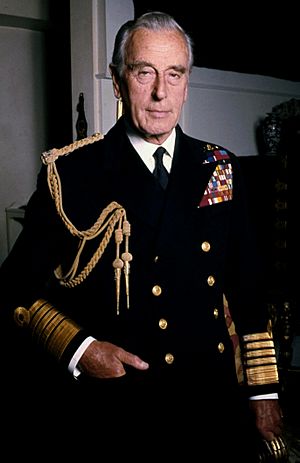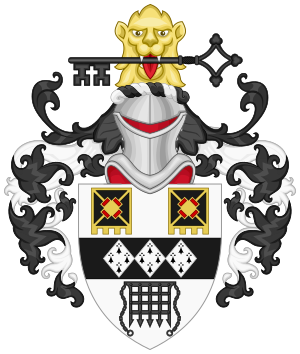British Computer Society facts for kids
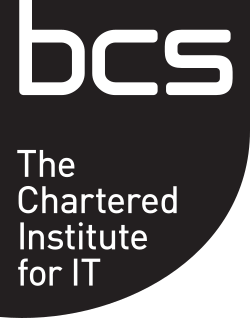 |
|
| Founded | 2 May 1957 |
|---|---|
| Founder | Sir Maurice Wilkes |
| Type | Professional Organisation |
| Focus | Information Technology |
| Location |
|
| Origins | London Computer Group |
|
Area served
|
Worldwide |
| Method | Chartered IT status, Industry standards, Conferences, Publications and regulation of ICT education |
|
Members
|
60,000 in 150 countries |
|
Key people
|
The Duke of Kent, KG (Patron) Daljit Rehal, President (2025-26) Sharron Gunn, CEO |
The British Computer Society (BCS) is also known as BCS, The Chartered Institute for IT. It is a group for people who work with computers and technology. This includes jobs in information technology (IT), computing, and software engineering. BCS helps people in the United Kingdom and all over the world.
It started in 1957. BCS helps train IT experts and makes sure they follow high standards. They also give special titles like Chartered IT Professional (CITP). BCS helps build a global community for people who love computers.
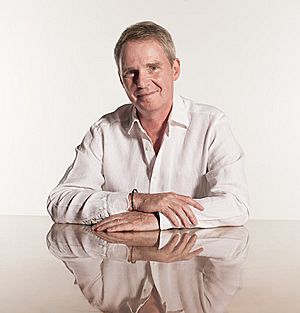
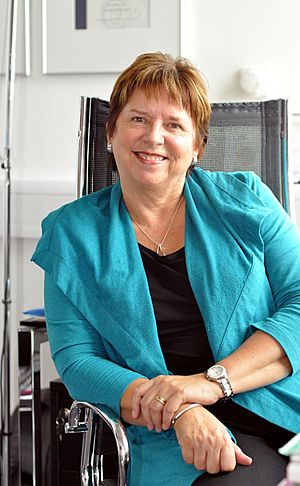
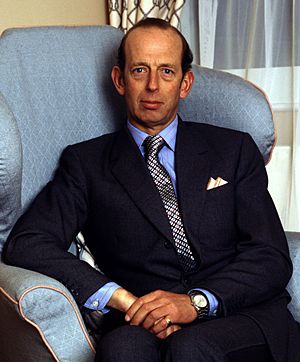
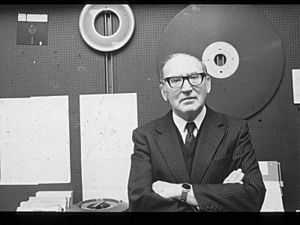
Contents
- What is the British Computer Society?
- The History of BCS
- How BCS is Run
- Becoming a Fellow of BCS (FBCS)
- What is a Chartered IT Professional?
- Different Types of BCS Membership
- Awards from BCS
- BCS Qualifications and Certifications
- How BCS is Organized
- Publications and Resources
- BCS Coat of Arms
- See also
What is the British Computer Society?
BCS has over 57,000 members around the world. It is a registered charity. In 1984, it received a special honor called a Royal Charter. This means the King or Queen officially recognized its important work.
BCS aims to teach people about computer and communication technology. They also want to improve education in IT. This helps both IT professionals and the general public.
How BCS Works with Other Groups
BCS is part of the Engineering Council. This allows them to give out titles like Incorporated Engineer and Chartered Engineer. They help set rules for IT and computer science in the UK.
BCS is also part of other European and international groups. These groups work together to make sure computer degrees are recognized worldwide. They also help ensure quality in IT education.
Where is BCS Located?
BCS has an office in London. Their main offices are in Swindon, Wiltshire. They also have offices in Sri Lanka and Mauritius.
Members of BCS receive a magazine called ITNOW. It comes out four times a year.
The History of BCS
The group that came before BCS was called the "London Computer Group." It started in 1956. BCS was officially formed in October 1957. Sir Maurice Wilkes was the very first President of BCS.
In 1966, BCS became a charity. In 1970, they received their own special Coat of Arms. This crest has a leopard's face. It reminds members to always be watchful and honest.
Prince Edward, Duke of Kent became the patron of BCS in 1976. He was also president from 1982 to 1983.
In 2009, the British Computer Society changed its name. It became "BCS, The Chartered Institute for IT."
How BCS is Run
BCS is managed by a group called the Trustee Board. This board includes the President and other leaders. Sir Maurice Wilkes was the first president. Each president serves for two years.
The Advisory Council helps the Trustee Board. They give advice on plans and budgets. This council represents the members of BCS.
Becoming a Fellow of BCS (FBCS)
The title Fellow of the BCS (FBCS) is a special honor. It is given to people who have done amazing things in IT. This includes leaders in technology and business. Fellows are expected to help promote the IT profession. They also share their knowledge at events.
To become a Fellow, people need to show strong leadership in IT. They must be known for their IT skills. They also need to have helped advance knowledge in the field.
Some famous Fellows include:
- Dame Wendy Hall – a former President of BCS.
- Andy Harter – CEO of RealVNC.
- Tony Hey – a former Vice President at Microsoft Research.
- Hermann Hauser – who started ARM Ltd.
- Frank Zhigang Wang – who invented a special type of computer memory.
BCS also gives Honorary Fellowships. For example, Dorothy Monekosso received this honor. She worked on Smart Homes for people with dementia. She also worked to encourage more diversity in tech.
What is a Chartered IT Professional?
BCS is the only group in the UK that can give the "chartered" title to IT professionals. This is thanks to their Royal Charter. People with this title are called Chartered IT Professional. They can use the letters CITP after their name. BCS keeps a list of all current Chartered Members.
Other professional groups can ask BCS for permission. This allows them to also award the CITP title to their members.
Different Types of BCS Membership
BCS has several levels of membership:
Special Honors
- Distinguished Fellow: Only a few people have received this highest honor.
- Honorary Fellowship (Hon FBCS): Given to people for special achievements.
Professional Levels
- Fellow (FBCS): For those with major achievements in IT.
- Member (MBCS): For experienced IT professionals.
Other Levels
- Associate Member (AMBCS): For those starting their IT career.
- Student Member: For students studying IT.
- Affiliate: For anyone interested in IT.
- Group membership: For companies that want their IT staff to join.
- Education affiliates: For schools and colleges that BCS works with.
Other Special Titles
BCS can also help members get other titles. These include Chartered Engineer (CEng) and Incorporated Engineer (IEng). They can also help with European Engineer (EUR ING) status.
Members are encouraged to use their special letters after their name. For example, a Chartered IT Professional who is also a Fellow might write FBCS CITP.
Awards from BCS
BCS gives out several awards. These awards recognize great computer scientists and engineers. They also honor experienced and young IT professionals.
Some of the awards include:
- Lovelace Medal
- Roger Needham Award
- Early Career Award
- John Perry Prize
- Distinguished Dissertation Award
- UK IT Industry Awards
BCS Qualifications and Certifications
BCS offers many qualifications. These are for people who use computers and for IT professionals.
BCS IT User Qualifications
These qualifications help people learn computer skills. They cover things like spreadsheets, presentations, and video editing. They also teach about staying safe online.
- European Computer Driving Licence (ECDL): BCS is the only group that offers ECDL in the UK.
- Advanced ECDL: This is a higher level of ECDL. If you pass all four parts, you become an "ECDL Expert."
BCS Higher Education Qualifications (HEQs)
BCS also has its own higher education qualifications. These are offered in many countries. They are like university degrees in IT.
- Certificate in IT: Like the first year of a university degree.
- Diploma in IT: Like the second year of a university degree.
- Professional Graduate Diploma in IT: Like a full university degree.
Other Certifications
BCS offers professional certifications through its Professional Certifications board. These cover areas like IT management and service delivery.
- Informatics Professional: BCS helps health and care IT professionals get registered. There are different levels like Practitioner and Advanced Practitioner.
How BCS is Organized
BCS has many local groups and special interest groups. There are 45 local groups in the UK. There are also 16 international groups and over 50 special interest groups.
UK Local Groups
- Aberdeen
- Bedford
- Berkshire
- Birmingham
- Bristol and Bath
- Cheltenham and Gloucester
- Chester and North-Wales
- Coventry
- Cumbria
- Dorset
- Edinburgh
- Glasgow
- Hampshire
- Hereford and Worcester
- Hertfordshire
- Humberside
- Inverness (Sub-Branch)
- Kent
- Leicester
- London (Central)
- London (North)
- London (South)
- London (West)
- Manchester
- Merseyside
- Mid-Wales
- Newcastle upon Tyne
- North Staffordshire
- Northampton
- Northern Ireland
- Nottingham and Derby
- Oxfordshire
- Preston and District
- Scotland Region
- Shropshire
- South Wales
- South West
- South Yorkshire
- Sussex
- Tayside and Fife
- Teesside and District
- Wales
- West Yorkshire
- Wiltshire
- Wolverhampton
International Groups
- Belgium
- Guernsey
- Hellenic Section (Greece)
- Hong Kong
- Isle of Man
- Jersey
- Malta
- Mauritius
- Middle East
- Sri Lanka
- Switzerland
- Toronto, Canada (Upper Canada Section)
- USA
- Zimbabwe
Special Interest Groups
- Animation and Games Development (AGD)
- APSG (Advanced Programming Group)
- Artificial Intelligence
- ASSIST
- BCSWomen (Women in IT)
- British APL Association
- Business Change
- Business Information Systems
- Computer Arts Society
- Computer Conservation Society
- Configuration Management
- Consultancy
- Cybercrime Forensics
- Cybernetic Machine
- DCSG (Data Centre Specialist Group)
- Data Management
- Digital Accessibility
- E-Learning
- Electronic Publishing
- ELITE (Effective Leadership in Information Technology)
- Enterprise Architecture
- Financial Services
- FACS (Formal Aspects of Computing Science)
- Fortran
- Geospatial
- Green IT
- Health Informatics (Interactive Care)
- Health Informatics (London and South East)
- Health Informatics (Northern)
- Health Informatics (Nursing)
- Health Informatics (Primary Health Care)
- Health Informatics (Scotland)
- Independent Computer Contractors (ICC)
- Learning & Development (L&D)
- Information Retrieval
- Information Risk Management and Assurance (IRMA)
- Information Security
- Interaction (formerly HCI)
- Internet
- IT Can Help
- Law
- Methods and Tools
- Natural Language Translation
- Open Source
- Parallel Processing
- Payroll
- Project Management (PROMS-G)
- Quality
- Quantum Computing
- Requirements Engineering (RESG)
- Scottish Testing
- Service Management
- Sociotechnical
- Software Practice Advancement (SPA)
- Software Process Improvement Network (SPIN-UK)
- Software testing
- Young Professionals Group (YPG)
Publications and Resources
BCS publishes magazines and journals about IT.
Their magazines include:
- ITNOW: A quarterly magazine for IT professionals.
Their journals are mostly published by Oxford University Press. They include:
- The Computer Journal: A monthly journal.
- Formal Aspects of Computing: A quarterly journal about formal methods in computing.
- Interacting with Computers: A journal about how humans and computers interact.
BCS also publishes Electronic Workshops in Computing (eWiC). This series shares papers from conferences and workshops.
BCS Coat of Arms
See also
 In Spanish: British Computer Society para niños
In Spanish: British Computer Society para niños
 | Jessica Watkins |
 | Robert Henry Lawrence Jr. |
 | Mae Jemison |
 | Sian Proctor |
 | Guion Bluford |


